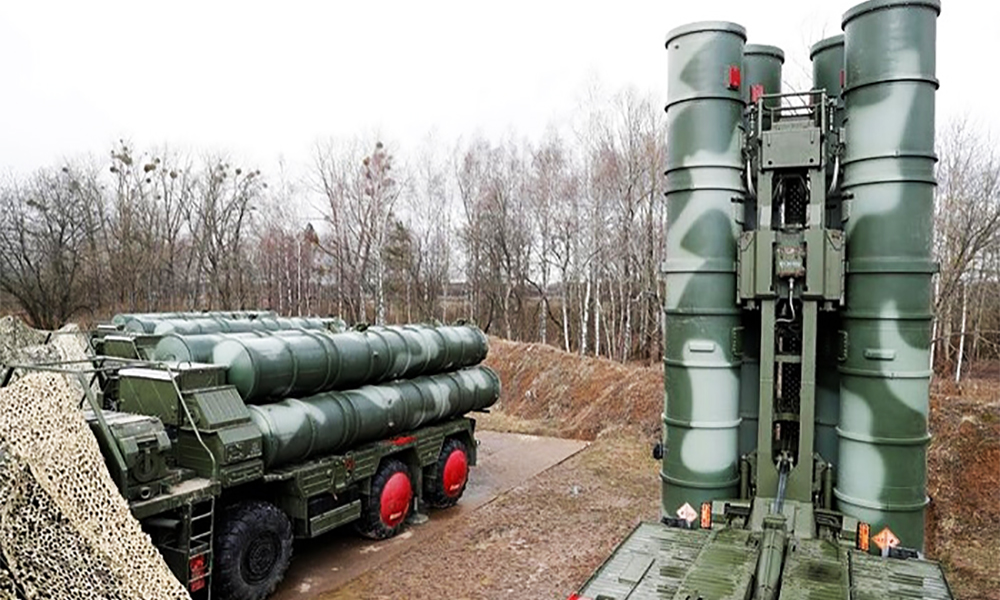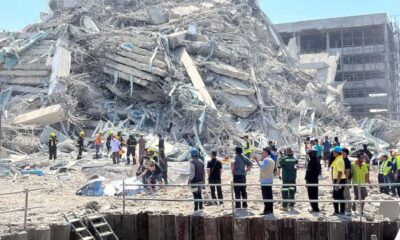World
Erdogan says Turkey plans to buy more Russian defense systems

President Tayyip Erdogan said Turkey still intended to buy a second batch of S-400 missile defense systems from Russia, a move that could deepen a rift with NATO ally Washington and trigger new U.S. sanctions, Reuters reported.
According to the report Washington says the S-400s pose a threat to its F-35 fighter jets and to NATO’s broader defense systems. Turkey says it was unable to procure air defense systems from any NATO ally on satisfactory terms.
“In the future, nobody will be able to interfere in terms of what kind of defense systems we acquire, from which country at what level,” Erdogan said in an interview that aired on CBS News’ “Face the Nation” on Sunday.
“Nobody can interfere with that. We are the only ones to make such decisions.”
The United States imposed sanctions on Turkey’s Defense Industry Directorate, its chief, Ismail Demir, and three other employees in December following the country’s acquisition of a first batch of S-400s, Reuters said.
Talks continued between Russia and Turkey about the delivery of a second batch, which Washington has repeatedly said would almost certainly trigger new sanctions.
“We urge Turkey at every level and opportunity not to retain the S-400 system and to refrain from purchasing any additional Russian military equipment,” said a State Department spokesperson when asked about Erdogan’s comments.
“We continue to make clear to Turkey that any significant new Russian arms purchases would risk triggering CAATSA 231 sanctions separate from and in addition to those imposed in December 2020,” the spokesperson added, referring to the 2017 Countering America’s Adversaries Through Sanctions Act.
The spokesperson also said the United States regards Turkey as an ally and friend and seeks ways to strengthen their partnership “even when we disagree.”
Erdogan will meet with President Vladimir Putin in Russia on Wednesday to discuss issues including the violence in northwestern Syria, read the report.
Erdogan also said that U.S. President Joe Biden never raised the issue of Turkey’s human rights track record, seen as extremely troublesome by international rights advocacy groups, confirming Reuters reporting from earlier in September.
Asked whether Biden brought up the issue during their June meeting on the sidelines of a NATO summit in Brussels, Erdogan said: “No he didn’t. And because we don’t have any problems of that nature in terms of freedoms, Turkey is incomparably free.”
Turkey is among the top jailers of journalists, according to figures from the Committee to Protect Journalists (CPJ), while Human Rights Watch says Erdogan’s authoritarian rule has been consolidated by the passage of legislation that contravenes international human rights obligations, Reuters reported.
World
Israel kills Hezbollah official in deadly Beirut airstrike

An Israeli airstrike killed four people including a Hezbollah official in Beirut’s southern suburbs on Tuesday, a Lebanese security source said, further testing a shaky ceasefire between Israel and Iran-backed Hezbollah.
The Israeli military said the official – Hassan Bdeir – was a member of a Hezbollah unit and Iran’s Quds Force, and he had assisted the Palestinian group Hamas in planning a “significant and imminent terror attack against Israeli civilians,” Reuters reported.
The Lebanese security source said the target was a Hezbollah figure whose responsibilities included the Palestinian file. The Lebanese health ministry said the strike killed four people – including a woman – and wounded seven others.
It marked Israel’s second airstrike in the Hezbollah-controlled suburb of Beirut in five days, adding to strains on the U.S.-brokered ceasefire that ended last year’s devastating conflict.
The attacks on Beirut’s southern suburbs have resumed at a time of broader escalation in the region, with Israel having restarted Gaza strikes after a two-month truce and the United States hitting the Iran-aligned Houthis of Yemen in a bid to get them to stop attacking Red Sea shipping.
Hezbollah lawmaker Ibrahim Moussawi said the Israeli attack amounted to “a major and severe aggression that has escalated the situation to an entirely different level”.
Speaking in a televised statement after visiting the building that was struck, he called on the Lebanese state to “activate the highest level of diplomacy to find solutions”.
Israeli Foreign Minister Gideon Saar said the eliminated Hezbollah operative posed “a real and immediate threat”. “We expect Lebanon to take action to uproot terrorist organizations acting within its borders against Israel,” he said.
Israel dealt severe blows to Hezbollah in the war, killing thousands of its fighters, destroying much of it arsenal and eliminating its top leadership including Hassan Nasrallah.
Hezbollah has denied any role in recent rocket attacks from Lebanon towards Israel, including one that prompted Israel to carry out an airstrike on the southern suburbs last Friday.
Tuesday’s strike in the early hours appeared to have damaged the upper three floors of a building, a Reuters reporter at the scene said, with the balconies of those floors blown out.
The glass on the floors below was intact, indicating a targeted strike. Ambulances were at the scene as families fled to other parts of Beirut.
There was no advance warning, in contrast to the attack on Friday when the Israeli military announced which building it intended to hit and ordered residents to leave the area.
Lebanese President Joseph Aoun condemned the latest airstrike, calling it a “dangerous warning” that signals premeditated intentions against Lebanon, which would intensify diplomatic outreach and mobilise international allies.
Lebanese Prime Minister Nawaf Salam said the strike was a flagrant breach of a U.N. Security Council Resolution upon which the ceasefire was based, and the ceasefire arrangement.
U.S. BACKS ISRAEL
The ceasefire agreement demanded that southern Lebanon be free of Hezbollah fighters and weapons, that Lebanese troops deploy into the area, and that Israeli troops withdraw.
But each side accuses the other of failing to implement the terms fully. Israel says Hezbollah still has infrastructure in the south, while Lebanon and Hezbollah say Israel is occupying Lebanese soil by not withdrawing from five hilltop positions.
The U.S. State Department said that Israel was defending itself from rocket attacks that came from Lebanon and that Washington blamed “terrorists” for the resumption of hostilities.
“Hostilities have resumed because terrorists launched rockets into Israel from Lebanon,” a State Department spokesperson said in an email, responding to a question from Reuters seeking reaction to Tuesday’s airstrike. Washington supported Israel’s response, the spokesperson said.
The Israel-Hezbollah conflict was ignited when Hezbollah opened fire in support of Hamas at the start of the Gaza war. It escalated in September when Israel went on the offensive, declaring the aim of securing the return home of tens of thousands of people evacuated from homes in the north.
The war uprooted more than a million people and killed at least 3,768 people in Lebanon, according to a Lebanese health ministry toll from November. Dozens more have been reported killed by Israeli fire since the ceasefire.
Lebanon’s figures do not distinguish between civilians and fighters.
During the war, Hezbollah strikes killed 45 civilians in northern Israel and the Israeli-occupied Golan Heights. At least 73 Israeli soldiers were killed in northern Israel, the Golan Heights, and in combat in southern Lebanon, according to Israeli authorities.
World
Trump says Zelenskiy wants to back out of critical minerals deal

U.S. President Donald Trump said on Sunday Ukrainian President Volodymyr Zelenskiy wants to back out of a critical minerals deal, warning the Ukrainian leader would face big problems if he did.
“He’s trying to back out of the rare earth deal and if he does that he’s got some problems, big, big problems,” Trump told reporters.
“He wants to be a member of NATO, but he’s never going to be a member of NATO. He understands that.”
(Reuters)
World
South Korea, China, Japan seek regional trade amid Trump tariffs

South Korea, China and Japan held their first economic dialogue in five years on Sunday, seeking to facilitate regional trade as the three Asian export powers brace from U.S. President Donald Trump’s tariffs.
The countries’ three trade ministers agreed to “closely cooperate for a comprehensive and high-level” talks on a South Korea-Japan-China free trade agreement deal to promote “regional and global trade”, according to a statement released after the meeting.
“It is necessary to strengthen the implementation of RCEP, in which all three countries have participated, and to create a framework for expanding trade cooperation among the three countries through Korea-China-Japan FTA negotiations,” said South Korean Trade Minister Ahn Duk-geun, referring to the Regional Comprehensive Economic Partnership.
The ministers met ahead of Trump’s announcement on Wednesday of more tariffs in what he calls “liberation day”, as he upends Washington’s trading partnerships.
Seoul, Beijing and Tokyo are major U.S. major trading partners, although they have been at loggerheads among themselves over issues including territorial disputes and Japan’s release of wastewater from the wrecked Fukushima nuclear power plant.
They have not made substantial progress on a trilateral free-trade deal since starting talks in 2012.
RCEP, which went into force in 2022, is a trade framework among 15 Asia-Pacific countries aimed at lowering trade barriers.
Trump announced 25% import tariffs on cars and auto parts last week, a move that may hurt companies, especially Asian automakers, which are among the largest vehicle exporters to the U.S.
After Mexico, South Korea is the world’s largest exporter of vehicles to the United States, followed by Japan, according to data from S&P.
The ministers agreed to hold their next ministerial meeting in Japan.
(Reuters)
-

 Business5 days ago
Business5 days ago36 mining contracts inked over the past year: Mines ministry
-

 Latest News4 days ago
Latest News4 days agoDried fruit market in Herat booms ahead of Eid-al-Fitr
-

 Regional5 days ago
Regional5 days agoPowerful quake in Southeast Asia kills several, Myanmar declares state of emergency
-

 Latest News5 days ago
Latest News5 days agoUS may ask for military equipment left behind in Afghanistan: Trump
-

 International Sports5 days ago
International Sports5 days agoLucknow’s six-hitting machine Pooran justifies top order slot
-

 Latest News4 days ago
Latest News4 days agoMore than 70,000 Afghans returned home in third week of March: IOM
-

 Health4 days ago
Health4 days agoGlobal organizations warn of health crisis due to aid cuts in Afghanistan
-

 Latest News5 days ago
Latest News5 days agoNegotiations with Afghanistan are the only way forward: Pakistan’s ex-PM Khan
























